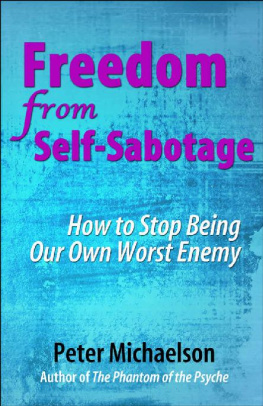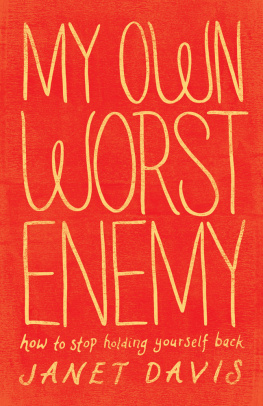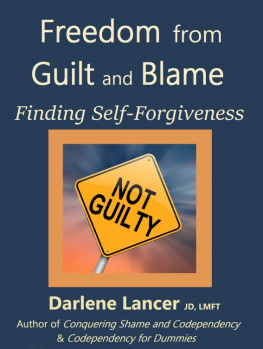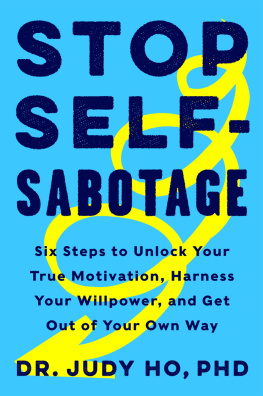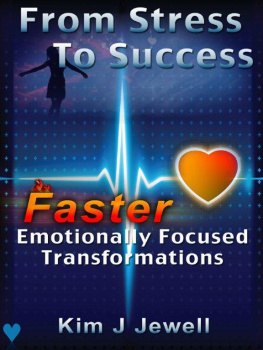Freedom from Self-Sabotage:
How to Stop Being Our Own Worst Enemy (Second Edition)
Peter Michaelson
Copyright 1999, 2015 Peter Michaelson
No part of this book may be reproduced or transmitted in any form or by any means, except for inclusions of brief quotations in a review. All Rights Reserved.
About the author
Peter Michaelson is a psychotherapist with a practice in Plymouth, Michigan. He does telephone sessions with clients throughout the United States and the world. He can be reached at petermichaelson33@gmail.com.
Also by the Author :
Psyched Up: The Deep Knowledge that Liberates the Self
Why We Suffer: A Western Way to Understand and Let Go of Unhappiness
Democracys Little Self-Help Book
The Phantom of the Psyche: Freeing Ourself from Inner Passivity
See Your Way to Self-Esteem: An In-Depth Study of the Causes and Cures of Low Self-Esteem
Secret Attachments: Exposing the Roots of Addictions and Compulsions
Books by Sandra Michaelson (1944-1999) :
The Emotional Catering Service: The Quest for Emotional Independence
LoveSmart: Transforming the Emotional Patterns that Sabotage Relationships
Is Anyone Listening? Repairing Broken Lines in Couples Communication
To order these books, visit Amazon.com or the authors website, WhyWeSuffer.com.
Table of Contents
Chapter 1
Chapter 2
Chapter 3
Chapter 4
Chapter 5
Chapter 6
Chapter 7
Chapter 8
Chapter 9
Foreword to the Second Edition
Self-sabotage is a peculiarity of human nature that oppresses the entire world. Many millions of us are under the influence of a mysterious psychological process that causes us to operate at subpar levels. Self-sabotage is the consequence of unresolved emotional issues and psychological conflicts. These inner dynamics cloud our intelligence and impair our common sense, while stranding us in self-absorption and negative outlooks.
Self-sabotage occurs on a personal level when we are jeopardizing our relationships and careers, ruining our finances, ignoring our health, failing at behavioral and emotional self-regulation, and making various unwise decisions. Self-sabotage on a national level occurs when societys complex processes are swamped by collective mediocrity, incompetence, stupidity, malice, self-serving ambition, appetite for risk, and indifference.
We havent been insightful enough to understand why bad things happen to good people. Our self-knowledge is lacking. We havent clearly understood our inherent psychological weaknesses. For starters, we have failed to recognize and overcome the human temptation to repeat and recycle unresolved negative emotions lingering in our psyche.
We can get to the roots of self-sabotage by examining the problem intimatelyat the level of personal self-defeat. This is where we resist acting on our own behalf, feel and act like a victim, hesitate to make life easier for others, react negatively out of proportion to events, and produce failure and unhappiness. Most of this book is devoted to personal self-sabotage, though I do, in addition, write on national self-sabotage in Chapter 8.
Each of us grows in our humanity when we expose how, in our psyches operating system, we unwittingly produce some variation and degree of self-sabotage. The nation and the world become more civilized as each of us becomes more insightful, healthier, and wiser. In this process of becoming less conflicted and more conscious, we free ourselves from negative emotions such as anger, greed, envy, fear, indecision, passivity, and hatred. We find a natural balance where our pursuit of fulfillment and happiness is in harmony with the greater good.
Self-sabotage occurs on both personal and national levels as a result of weak self-regulation, negative reactions, and compulsive patterns of behavior that have their source in our psyche. This sabotage is the end result of a mysterious configuration of drives, conflicts, and attachments that toil unremittingly against our best interest. If we dont succeed in identifying and neutralizing these inner dynamics, we may never break free of some measure of self-inflicted failure.
Self-sabotage has been called the enemy within, the shadow, the dark side, and the inner saboteur. It is a universal condition of humankind. At its worst, it has been identified diagnostically as Self-Defeating Personality Disorder. It comes in many guises, stalking us at times in the form of self-denial, self-doubt, self-disapproval, and self-condemnation.
I reveal in this book the configuration of this secret part of us, and I show how we can liberate ourselves from it. Readers will learn why this knowledge has not been assimilated by the public, and why even mental health professionals arent conversant with it. This book illustrates self-sabotage on a personal level and provides numerous exercises for freeing ourselves from its invisible shackles. The book contends that personal self-sabotage is so common and pervasive that it puts our nation and even our species at risk. Through our psychological dysfunction, we contaminate society, culture, and the political process with a failure of intelligence and integrity.
Human consciousness sometimes moves at a glacial pace. Then breakthroughs happen, as with the rapid progress that occurred in America in civil rights and womens rights in the second half of the 20 th Century. Now our global village is digitally entwined, and consciousness moves, figuratively at least, at the speed of light. A new sense of human rights is sweeping across the globe as restive populations clamor for more freedom and an end to corruption, privilege, and tyranny. The knowledge in this book contributes to this growing hunger for evolvement by exposing the unconscious dynamics in our psyche that have been limiting our sense of value and obstructing our freedom and creativity.
Human resistance is the biggest obstacle to personal and national progress and development. Learning deep knowledge about our psyche brings up resistance in the form of fear and denial. Self-knowledge is powerful. It can change us dramatically. Through the mysterious process of resistance, we often hesitate to move forward into a more open, liberated sense of self. Were afraid that self-knowledge will erode our identity, limited though it may be. Hence, we instinctively deny the importance of this knowledge.
Some of the smartest people fall prey to self-sabotage. A person can be smart about many things, while being quite dumb about the inner dynamics that are targeting him or her for self-defeat. Being smart doesnt help much if unconscious content remains hidden from our intelligence. Were in the same boat as a government agent who, though clever and alert, nonetheless fails to stop a terrorist attack because the intelligencemeaning in this case the necessary facts about when and how the attack is to be launchedis missing.
Self-sabotage becomes blatant when it surfaces as sexual misconduct on the part of powerful men. Those damaged by such exposure include Tiger Woods, Arnold Weiner, Bill Clinton, John Edwards, Newt Gingrich, Larry Craig, Eliot Spitzer, John Ensign, and Arnold Schwarzenegger. Celebrity missteps get all the headlines, while the missteps among everyday people, sexual or otherwise, go unreported. Our missteps dont have to be spectacular blow-upsthey can consist, for instance, simply of the cumulative effects of passivity, procrastination, and stubbornness that produce mediocrity along with a lack of initiative and vision.
Self-sabotage through sexual acting-out is just one small facet of a huge problem. On a personal level, self-sabotage gets acted out in all kinds of ways, including in relationships, in our careers, in our problems of self-regulation, and in the ways we think and feel about ourselves. For the purposes of this book, the terms self-sabotage and self-defeat are used interchangeably. The former term, perhaps, conveys a more gruesome sense of stabbing oneself in the back.
Next page
